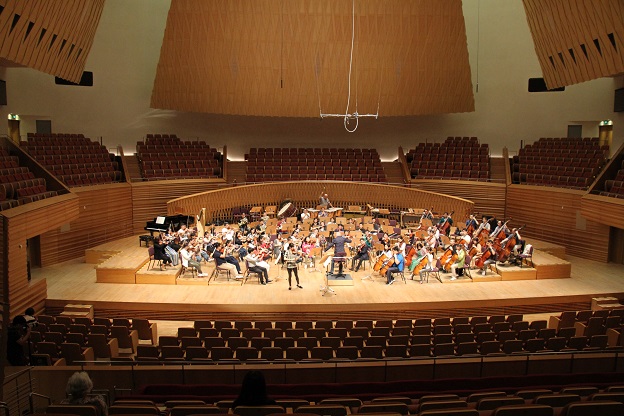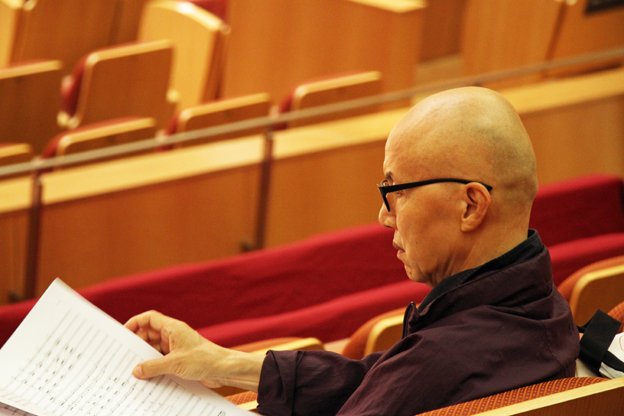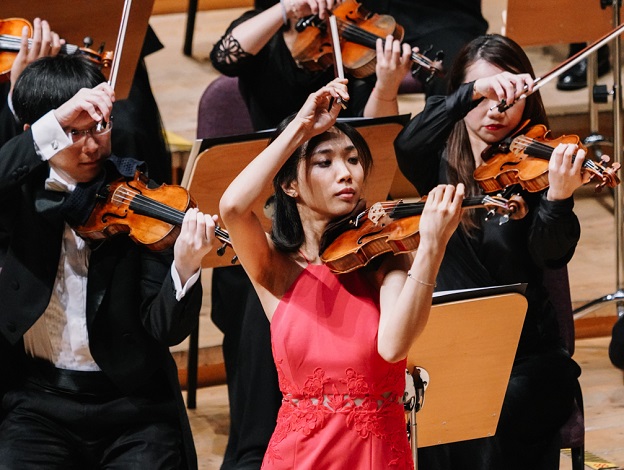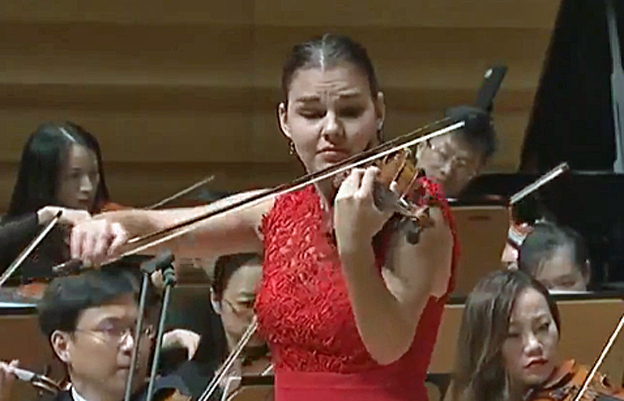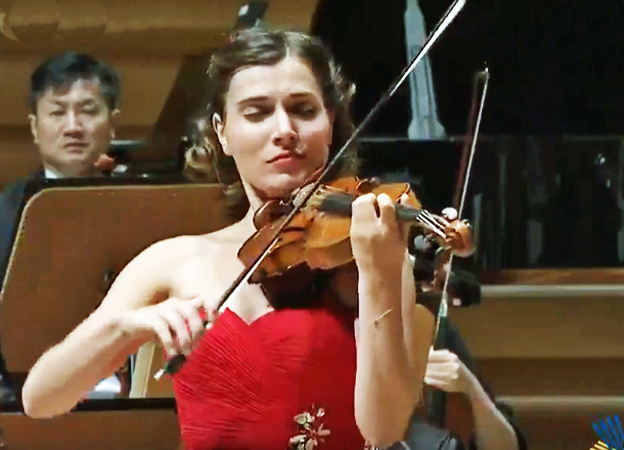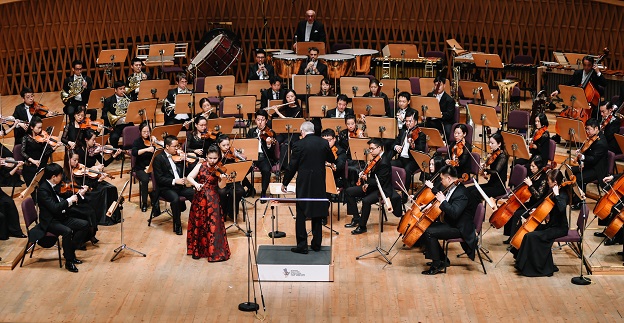Organized by the Shanghai Symphony Orchestra, the second Shanghai Isaac Stern International Violin Competition was certainly an inspiring event. Remy Franck looks retrospectively on the competition, the final of which he attended in the Chinese megalopolis.
Shanghai is a very special city, where traditions seem to get lost in a highly consumeristic society, where the older parts, Bund and the former French Concession, face the amazing skyscrapers of the new Pudong district. The result of what once was called a commercial economic experiment is today a cosmopolitan place, where the shops have English names, where every single high-class fashion or accessories company is represented, where one big and fashionable shopping mall seems to overbid the other one. Yet, in this consumer paradise, some old markets still invite to escape of the busy glitzy megalopolis.
Such an escaping is also possible in Shanghai Symphony’s luminous and acoustically excellent concert hall, where the competition took place.
The hall is located in the former French Concession, where many of the treelined streets have an almost Parisian atmosphere.
The foreign visitor is surprised, of course, by the audience. In the first two concerts of the final round, the audience was particularly young, with an average under 20, while the last concert had less teens attending, but the average age was still under 30.
The Shanghai Symphony Orchestra played under the direction of Michael Stern and convinced with good performances. This orchestra was founded in 1879, so being the earliest Chinese symphony orchestra. It has played in New York’s Carnegie Hall as well as at Berlin’s Philharmonie.
With its current Music Director Long Yu the orchestra recently signed a contract with Deutsche Grammophon and will soon release its first recording on the renowned Yellow Label.
During the competition, every finalist had to play the new violin concerto ‘La Joie de la Souffrance’ written by composer Qigang Chen, born in 1952 in Shanghai and living in France since 1984, when he became Olivier Messiaens last pupil. In 1992, be took French nationality. His concerto was co-commissioned by the Stern Competition, the Melbourne Symphony Orchestra, the New Jersey Symphony Orchestra and the Orchestre National du Capitole de Toulouse.
The work is based on the Chinese tune Yang Guan San Die, from the Tang dynasty, and explores the relationship between joy and suffering. Chen views these seeming opposites as « a matter of Yin and Yang, inseparable and hence all things should contain both. Like loss and gain, they are bound to balance out. »
The work is a beautifully shaped romantic concerto with characteristic melodies. It’s a truly appealing composition, which could easily become a strong repertoire piece.
The First Prize (100.000 USD) of this year’s competition was awarded to American violinist Nancy Zhou (25). She won with an advance of only one point (1216 versus 1215) over Olga Sroubkova (Czech Republic, 25). The comparison of the jury’s notes shows that it were essentially French jury members Augustin Dumay and Emmanuel Hondré who prevented the Czech violinist from winning First Prize, a prize she really would have deserved, as for me, she was by far the best candidate in the competition.
While Nancy Zhou played the Tchaikovsky Concerto with a certainly brilliant and virtuosic technique, the music completely lost its Russian character and soul. She might have added some new and personal ideas, yet all those ideas were absolutely incoherent. Chen’s concerto
La joie de la souffrance was also performed in a highly virtuoso manner, but the violinist failed to show a spiritual understanding of the music.
Olga Sroubkova however gave the Tchaikovsky concerto the warmth, the colours and the sensitivity needed to make it a Russian piece. Sroubkova also was a marvellous, finely differentiating performer of Chen’s Concerto, and unlike Zhou she made a whole out of it.
Like me, five of the Jury members considered that Sroubkova was the best candidate in the final and gave her more points than Zhou.
The Third Prize was awarded to Ukrainian violinist Diana Tishchenko (Ukraine, 28). She played Qigang Chen’s romantic violin concerto ‘La joie de la souffrance’ in a rhetoric and passionate manner, thus entering in a fruitful dialogue with the orchestra.
Tishenko was also a convincing performer of the Tchaikovsky Concerto, in which she created long melodic lines, showing a good feeling for the music’s structural development.
Jia Yi Chen (China, 22) won Fourth Prize. Her performance of the Chen Concerto might have been idiomatic and contained some magic moments, but generally the lack of precision was irritating. Much better was her playing in Antonin Dvorak’s Violin Concerto, which she finely articulated with beautiful colours and a breathing that showed how sovereign this performance was.
The youngest candidate, Chang Yuan ‘Belle’ Ting (Canada, 18), was quite convincing in the Chen Concerto, in which she effectively differentiated the various parts. Alas, her performance of the Brahms Concerto was catastrophic. Ting obviously made the wrong choice with this piece which she was not ready for, and it was painful to witness this run in a disaster.
Chinese violinist Yun Tang (China, 26), a pupil of Pierre Amoyal at Salzburg’s Mozarteum, won Sixth Prize with a rather poor performance of Dvorak’s Violin Concerto and an overall satisfying interpretation of the Chen Concerto.
In retrospect I must say that all six candidates gave interesting performances of Chen’s work, and we heard six very different accounts of it, all of them developing different ideas. This definitely shows that the piece has a true potential.
So, at the end, one must conclude that this second edition of the Shanghai Isaac Stern Violin Competition was a great success and forms a reliable basis for the development of this young competition. In 2020, the third edition will coincide with Isaac Stern’s 100th birthday. It’s certainly a great opportunity to make this an exceptional vintage.











